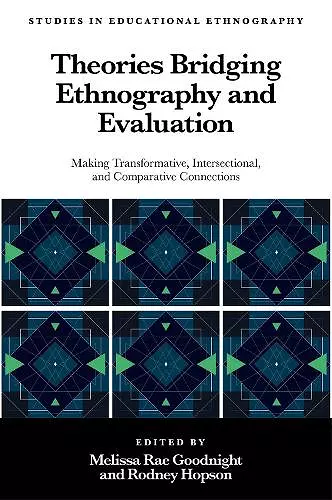Theories Bridging Ethnography and Evaluation
Making Transformative, Intersectional, and Comparative Connections
Rodney Hopson editor Melissa Rae Goodnight editor
Format:Hardback
Publisher:Emerald Publishing Limited
Published:29th Nov '24
£75.00
Supplier delay - available to order, but may take longer than usual.

Theories Bridging Ethnography and Evaluation is the first of two volumes examining the connections between ethnography and evaluation in educational spaces. These volumes wrestle with pressing justice issues in today’s societies while elucidating three themes—transformative, intersectional, and comparative—for guiding contemporary inquiry committed to realizing equity.
Chapters situate inquiry in wide-ranging theories and the contested histories and policies of contexts—whether these spaces are globally, nationally, or locally defined. Exploring essential concepts (positionality, transparency, authenticity, and reciprocity), authors analyze the philosophical, methodological, relational, and ethical dimensions of the interconnected practice of ethnography and evaluation. Authors also highlight their own experiential learning: how these concepts are forged not only from literature but also from their lived experience of doing this transformative scholarship in the United States, Palestine-Israel, and India.
Fusing interpretivist and transformative epistemologies, emphasizing both emic understandings and critical framings of social issues, Theories Bridging Ethnography and Evaluation draws upon social justice frameworks for conducting research and evaluation, including anti-racist, culturally responsive, and feminist theories.
The fusion of ethnography and evaluation addresses a longstanding need to integrate issues of culture in a systematic way into evaluation theory and practice. This fusion strengthens evaluators’ potential to contribute to the transformation of education programs, systems and policies towards increased justice and cultural responsiveness. The focus on intersectionality, international, and national understandings of ethnography’s contribution to a more culturally responsive approach to evaluation provides the reader with an expansive opportunity to uncover oppressive cultural beliefs and norms, challenge asymmetric power structures, and address issues of discrimination and injustice in pursuit of positive changes in schools. The contributing authors share their personal and professional experiences in ways that make the cost of failure to transform educational systems more tangible and heart-rending.
-- Donna M Mertens, Professor Emeritus, Gallaudet UniversityThis collection of empirical and methodological challenges to ethnography and evaluation will push researchers and systems of evaluation to rethink harmful, generalized, and overly-static modes of evaluation. This volume shows the importance of centering community knowledge, local expertise, and more nuanced approaches to evaluation and ethnography. This is a must-read for critical ethnographers and those committed to community-rooted, sustainable and critical evaluation practices in education.
-- Professor Jennifer Keys Adair, The University of Texas at Austin,ISBN: 9781835490204
Dimensions: 229mm x 152mm x 15mm
Weight: 372g
200 pages